I love talking to children and adults about books, writing, and being an author! Please see the descriptions of available programs below, or let me know if you’d like something different. I’m always refining or adding programs, so don’t hesitate to ask! Contact me with any questions.
In-Person Visits
Please contact me with any questions or to schedule an in-person presentation.
Virtual Visits
After any of my books has been used in a classroom, I gladly offer a free 15-minute virtual “Q&A with the Author.” Schedule yours here!
I also offer all of my full programs online via the platform of your choice at 50% off my in-person rate. Please contact me with any questions or to schedule a virtual presentation.
For a select list of past appearances, please visit my Press Kit page.
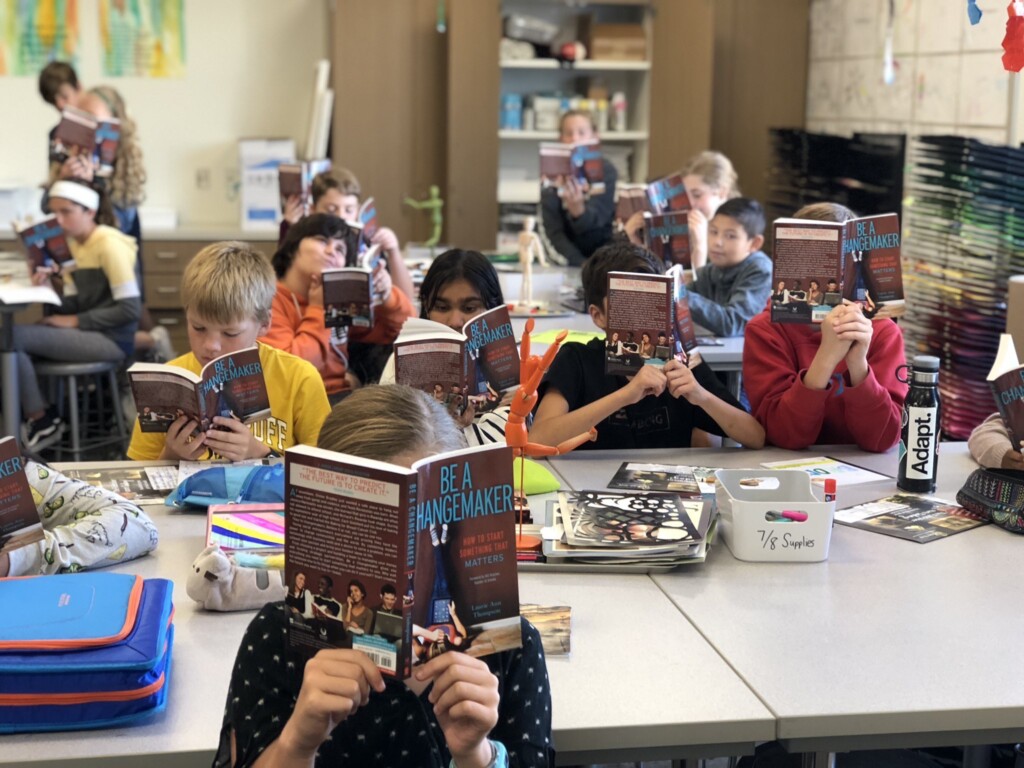
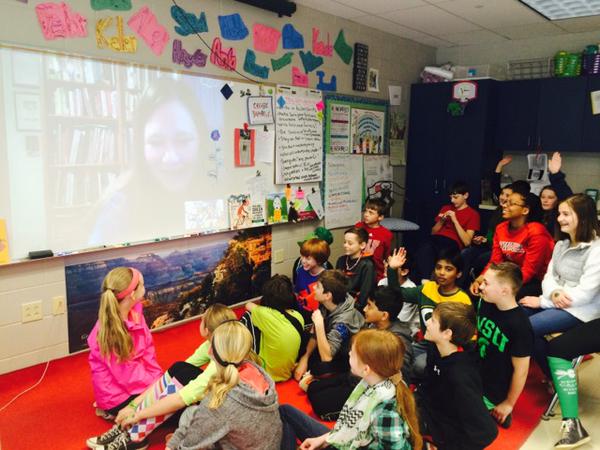
Author Visit Programs
A “Let’s Pretend!” Storytime
15–45 minutes
grades PreK‑2
classroom or assembly
I’ll get little ones up and moving with a lively interactive reading of your choice of one or more of my books from the Meet Your World series: You Are a Honey Bee!, You Are a Raccoon!, You Are a Robin!, or You Are a Garter Snake! Your students will be wiggling and giggling, but they’ll also be getting a close-up look at how animals survive and thrive in the wild. They’ll learn what makes the animal unique, but they’ll also see how much we have in common with them: we all have families, we all need food to eat and a place to sleep, we all grow and change, we all want to be safe, etc. In this way, students will be left with a sense of connection to the natural world and to each other, inspiring both stewardship and empathy. If time allows, I’ll also invite questions.
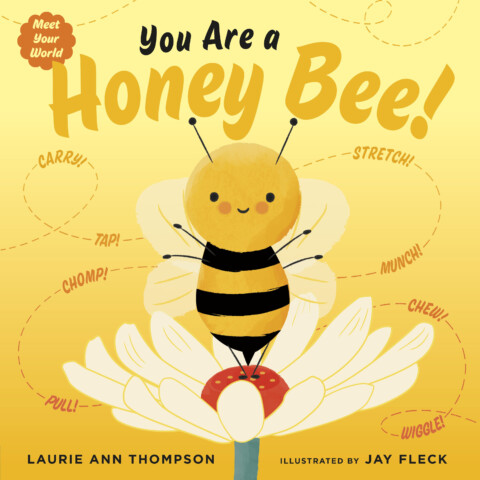
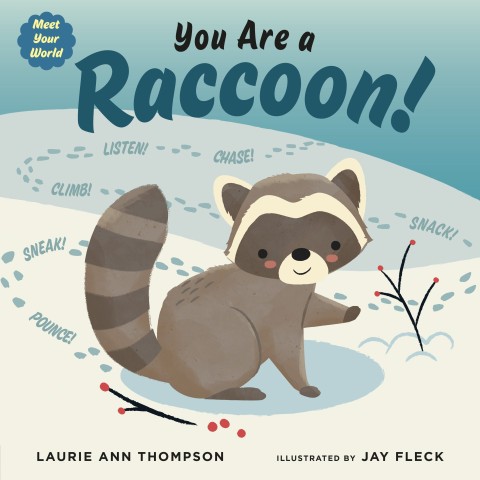
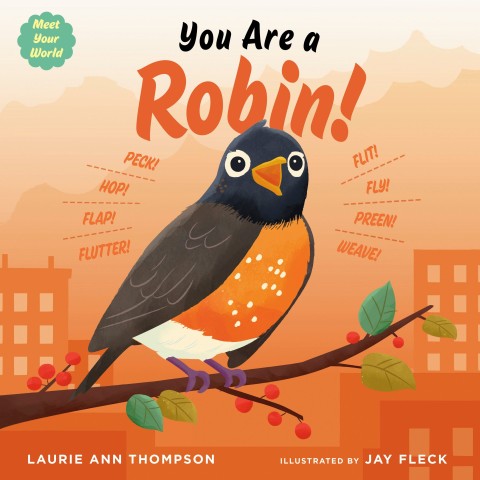
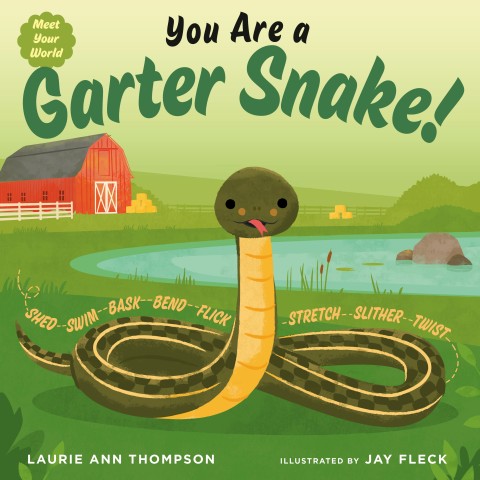
Emmanuel’s Dream: The Story Behind the Story
40–60 minutes
grades 2–6
classroom or assembly
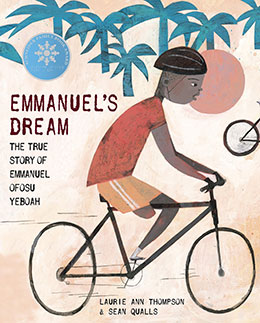 In this presentation, I’ll read from my award-winning picture book biography, but with a twist: I’ll annotate each spread as I go, adding insights about my research and writing processes and sharing additional facts and information that didn’t make it into the book. Students will learn about the work that goes into writing a nonfiction book and hear how an author makes decisions along the way. They’ll come away with a deeper appreciation for the story itself as well as books in general. There will be ample time for Q&A about Emmanuel, the book, or writing in general. Note that this presentation works best if students are already familiar with the story.
In this presentation, I’ll read from my award-winning picture book biography, but with a twist: I’ll annotate each spread as I go, adding insights about my research and writing processes and sharing additional facts and information that didn’t make it into the book. Students will learn about the work that goes into writing a nonfiction book and hear how an author makes decisions along the way. They’ll come away with a deeper appreciation for the story itself as well as books in general. There will be ample time for Q&A about Emmanuel, the book, or writing in general. Note that this presentation works best if students are already familiar with the story.
Testimonial: “I am so deeply thankful for your visit with our students in Discovery Club this summer. The students’ eyes were glued on you, and they were just soaking in your every word as you told stories about researching and writing a book! I could tell they felt very special to get a sneak peek of your soon-to-be-published books. They were truly captivated by your time with them, and you intuitively found ways to show them that all of their questions and ideas were important. We would love for you to visit our students again next year!” (Teddy Dillingham, Lead Educator, Imagine Children’s Museum)
Writing Workshop: Where Do You Get Your Ideas?
30–60 minutes
grades 1–6
classroom/workshop
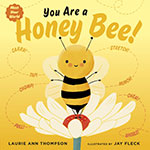 First, I’ll discuss each of the steps in the writing process: ideas, research, planning/outlining, drafting, revising, and editing. I think it’s important for students to hear that professional authors follow the same steps being taught in school! Then, I’ll dig deeper into the most crucial–but most often overlooked–step: finding a good idea. Together, we’ll do some exercises to help students start making their own unique idea lists, bound to inspire creativity and motivation in any writing genre. Finally, I’ll share some tips on how we can all continue to become better writers.
First, I’ll discuss each of the steps in the writing process: ideas, research, planning/outlining, drafting, revising, and editing. I think it’s important for students to hear that professional authors follow the same steps being taught in school! Then, I’ll dig deeper into the most crucial–but most often overlooked–step: finding a good idea. Together, we’ll do some exercises to help students start making their own unique idea lists, bound to inspire creativity and motivation in any writing genre. Finally, I’ll share some tips on how we can all continue to become better writers.
Testimonial: “Thanks so much for your visit to our classroom. It is so important for kids to connect their work in the classroom to authentic, real-life writing that people do in the real world. Your visit was so different from our typical author-visit… we hardly ever get to meet real authors who write non-fiction! The kid-friendly articles you shared fit in perfectly with our study of non-fiction text features, and the tips on generating ideas, conducting research, and then actually writing and publishing your work were all things my 1st graders could really connect to. The students were very engaged throughout your entire talk. Thanks so much for bringing the real world to our classroom, and sharing all your interesting articles!” (Michal Friesen, first grade teacher, Woodridge Elementary, Bellevue, WA )
Truth and Lies: Can You Tell the Difference?
40–60 minutes
grades 3–8
classroom or assembly
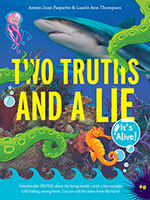 In this presentation, I’ll introduce concepts of information literacy and effective research techniques through my Two Truths and a Lie books (co-authored with Ammi-Joan Paquette). Students will learn why being able to spot fake news and question truthfulness is important, and I’ll show them how to evaluate information and sources using the SIFT method. Finally, I’ll share additional tricks on how to avoid getting fooled by less-than-factual information. Students will leave with a heightened sense of skepticism and newfound self-sufficiency, both as consumers and as producers of information.
In this presentation, I’ll introduce concepts of information literacy and effective research techniques through my Two Truths and a Lie books (co-authored with Ammi-Joan Paquette). Students will learn why being able to spot fake news and question truthfulness is important, and I’ll show them how to evaluate information and sources using the SIFT method. Finally, I’ll share additional tricks on how to avoid getting fooled by less-than-factual information. Students will leave with a heightened sense of skepticism and newfound self-sufficiency, both as consumers and as producers of information.
Testimonial: “Thank you so much for coming and talking to our 6th-grade students! They really enjoyed meeting you and hearing about your writing process. Thank you for reviewing how to find credible resources and spot fake news! The acronym for evaluating research… will stick with them. They loved reading the book for science, and it has been a favorite for informational reading. Sorry we were unable to spot any tree octopods during your visit.” (Brooke Hendry and Jessica Bruning, Jefferson Elementary, 6th grade team)
Writing from the Heart
30–60 minutes
grades K‑6
classroom or assembly
 I will read from Emmanuel’s Dream and use it to show how we make our writing more relevant to both ourselves as writers and to our readers. This author visit offers a glimpse of my writing journey from inspiration to publication and discusses grit and letting go of perfectionism. Students will leave knowing we are all writers and that sharing our stories matters for each and every one of us, whether we’re professional authors or not.
I will read from Emmanuel’s Dream and use it to show how we make our writing more relevant to both ourselves as writers and to our readers. This author visit offers a glimpse of my writing journey from inspiration to publication and discusses grit and letting go of perfectionism. Students will leave knowing we are all writers and that sharing our stories matters for each and every one of us, whether we’re professional authors or not.
You Can Be a Changemaker
flexible length
all ages
large or small groups, optional hands-on workshop elements
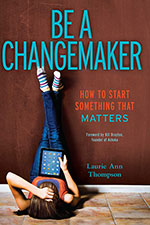 Drawing on my age-appropriate books (either Be a Changemaker or Emmanuel’s Dream or Elizabeth Warren’s Big, Bold Plans), this author visit presentation will introduce youth to the idea that, in today’s world, everyone can—-and should—-strive to be a changemaker. I present real-world examples of young people who had made their marks on the world. I also inspire students to dream big and take positive action in their communities and beyond. Finally, I give students practical tips for success in their own future changemaking efforts. For smaller groups and/or older students, hands-on workshop elements can be included.
Drawing on my age-appropriate books (either Be a Changemaker or Emmanuel’s Dream or Elizabeth Warren’s Big, Bold Plans), this author visit presentation will introduce youth to the idea that, in today’s world, everyone can—-and should—-strive to be a changemaker. I present real-world examples of young people who had made their marks on the world. I also inspire students to dream big and take positive action in their communities and beyond. Finally, I give students practical tips for success in their own future changemaking efforts. For smaller groups and/or older students, hands-on workshop elements can be included.
Testimonial: “Laurie Thompson is a thoughtful, clear and engaging presenter. She spent an hour with our 5th and 6th graders as a culmination to our Lucy Calkins TCRWP unit on informational writing. We used both Emmanuel’s Dream and Be a Changemaker as mentor texts for the Teen Activism topic. There is nothing better for the variety of writers in a classroom—emergent, reluctant and proficient—than to hear a published author talk about the struggle and time it takes to create a published piece. The message that writing is ‘never done’ was professionally and perfectly conveyed to students. If you’re looking for ways to engage your students in writing and in making a difference, Laurie Thompson will share her passion with them!” (Maureen Juenger, 5/6 Grades, Sunrise Elementary, Redmond, WA)
Adult Programs
Writing to Save the World
flexible length
teens or adults
This is an inspirational and explorational presentation for adult writers of all genres and skill levels. I share quotes about the importance of writing and writers along with examples from my own publishing journey. I also help participants tap into their creativity and passions to discover their true writing purpose through several short, simple writing exercises. Participants should walk away with a greater sense of conviction about the value of their work in the world as well as new tools to help them keep it moving forward.
Writing Nonfiction for Kids | Overview and Resources
30–90 minutes
adults
In this presentation for adult writers, I provide an overview of the market for nonfiction for children, including magazines, educational/work-for-hire, and trade markets for picture books as well as middle-grade and young-adult nonfiction books. I discuss how to break in and build a career in each of these areas, as well as provide my favorite resources for all writers of nonfiction for children. Depending on the depth desired, this presentation can be 30–90 minutes long.
